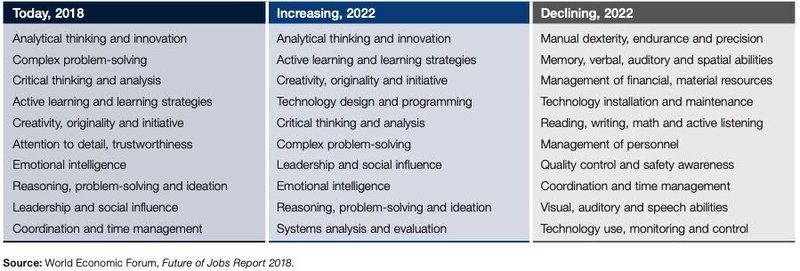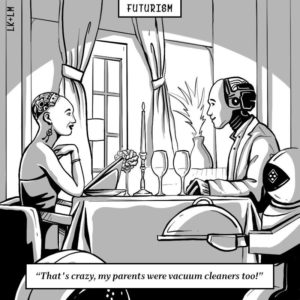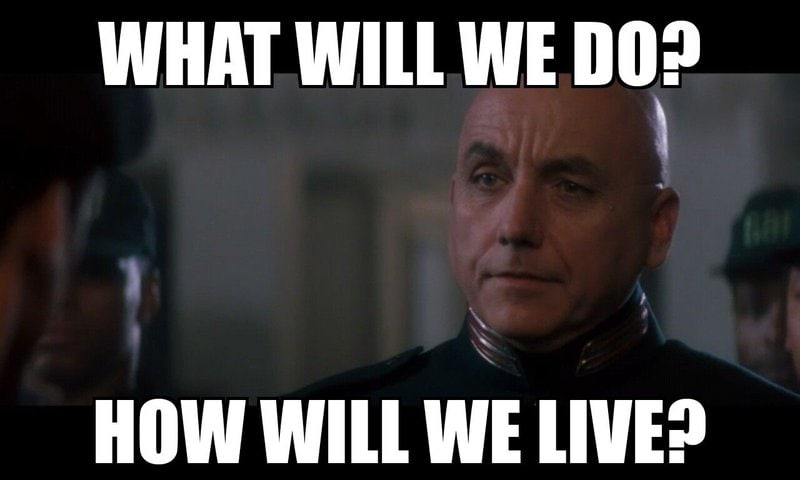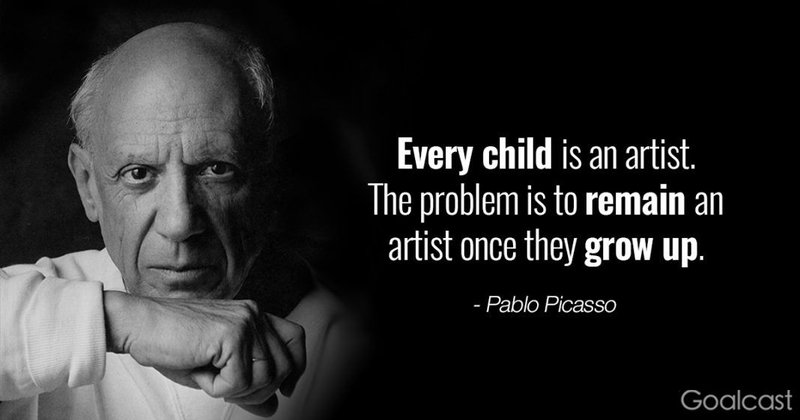In my last blog post I gave you a brief rundown of the future of work. It painted a picture of what you can expect as artificial intelligence grows and wreaks havoc on human employment.
Now if you haven’t read my last blog post, I suggest you head back to it here and give it a read. However, if you have read my last post, then by all means read on!
The Future of Work
The Fourth Industrial Revolution is happening–it’s a thing. We are in the midst of it now.
That said, you probably have the same question I had when I started researching this phenomenon: What do I need to do to survive the future? What skills do I need?
An important set of questions for sure!
But here’s a secret … You don’t need to try to become Tony Stark. I mean, if you have that capacity then go for it.
Nevertheless there is a shift taking place that will cause us to learn a thing or two.
The Upside-down World
The rise of AI is creating a rift between skills that are valuable and relevant and skills that aren’t. The hard skills are becoming soft and the soft skills are becoming hard.
Let me explain.
In my last post I told you about the World Economic Forum. I described it as one of the leading supra-national think tanks that helps create and establish a global agenda. Therefore, the World Economic Forum is a good organization to follow for understanding the future.
One report that is important to read about the future of work is called Towards a Reskilling Revolution. Written by Boston Consulting and the World Economic Forum, the report is about the impact of technology on jobs. Moreover, the report lays out the kinds of skills needed to survive this transformation.
However, the report uses funny words like ‘upskill’ and reskill’. Here’s a quote from the WEF report:
“All these profound transformations—from the changing type and nature of jobs to the rapid change in the skills needed—create an imperative for upskilling the workforce and providing targeted reskilling opportunities to those whose jobs will be highly disrupted by automation and other technologies.”
What in the World Does Upskilling Mean?
As I was writing these words ‘upskilling’ and ‘reskilling’ my spellchecker was going crazy—these are clearly new words.
But what do they mean?
Here’s how the WEF defines them.
‘Upskilling’ is the act of “learning new competencies to stay in a current role due to the change in skills required or adding certain competencies for career progression.”
‘Reskilling’ is the act of “learning new sets of competencies to transition to a completely new role.”
You’re probably wondering, if I decide to reskill or upskill what do I reskill or upskill to?
Let’s look at the 3 highest demand skills for the Fourth Industrial Revolution …
Top 3 Skills for the Future of Work
The WEF created a list of high demand skills for 2018 juxtaposed with those for 2022. In addition to high-demand skills, the list includes skills that are now in decline.
Here are the top 3 emerging skills according Fortune 500 companies surveyed by the World Economic Forum:
- Analytical Thinking and Innovation
- Active Learning and Learning Strategies
- Creativity, originality, and initiative.
Now check out the table below. Notice that among the top declining skills are those expected to become fully automated in the next 2-3 years:
- Manual dexterity
- Endurance and precision
- Management of financial and material resources.
Additionally, there a number of “mental skills” that are in decline such as, memory, visual, auditory and speech abilities. These mental skills are strong points for artificial intelligence, machine learning and smart (voice-controlled) support systems.

When I first read the report I was shocked by the top three skills–and I research this stuff for a living!
Think about it. Of all the skills or ways we need to reskill, innovation and creativity top of the list along with continued learning.
While this may seem to you like a coup attempt by a bunch of bearded thick-framed hipsters sitting in a think tank somewhere plotting out a true revenge of the nerds, it makes a lot of sense.
Why Creativity is Important
There’s a deeper reason why creativity, originality, and initiative are at the top of the list.
Creativity is an essential part of being human, for it is one of the ways we bear the image of God. You can’t automate creativity and authenticity. Moreover, creativity reveals your originality or authenticity as much as your fingerprint does. That originality in turn reflects a loving Creator God who cares for His creation.
Innovation is the application of creativity to problems and challenges. Like creativity, innovation requires vision–a way of seeing beyond your circumstance to the creation of something new. New ideas come out of creativity and the vision you have for a different future. The key to innovation is pulling what you see, your vision, into the now.
While AI can do a lot of things, it cannot create like a human being–it will always lack the human spirit. And AI cannot be original, authentic like a human being is created to be. The human being is eternally more than a mere epiphenomenon of brain matter.
A Radical Shift to a New Economy

Nevertheless, what is emerging now in the wake of COVID-19 is the rise of a new technological age that will be vastly different from what we have previously experienced.
The WEF Reskilling report presents a near-future scenario of advanced technological systems. It shows that what we have relied upon as work in the past will quickly fade into memory.
Work will no longer be what we currently understand as ‘work’.
Work will look very different. And it will feel different—and different kinds of ‘entities’ will be doing the work.
So where does that leave us?
When You Realize You Just Reached the End of Netflix …
Looking at some of the scenarios coming out of the COVID pandemic, it is likely that in the next 2-3 years many of us will be working from home with a lot of time on our hands.
Just this week the CEOs of Twitter and Square announced that its employees can work from home permanently once the COVID restrictions are lifted.
These are the early adopters—what about the rest?
Many of us will be receiving some kind of government subsidized income while the big tech companies will continue to flourish and dominate the rate of change creating content for everything from entertainment to education. This rate of change is driving the reskilling revolution.
One question for me is …
What will people do with all that free time?
I mean …
What happens when you really do get to the end of Netflix? …

But there is a silver lining …
No seriously …
There’s so much life outside of Netflix.
The Opportunity in the Storm

Each one of us is born with a vocation, with a calling.
When we were younger we dreamed of doing all kinds of things.
Then we went to college, graduated with all kinds of debt, and got into lines of work that maybe paid the bills but were not aligned with those dreams we once had.
Some of us made up for it by turning those dreams into hobbies that we worked on in our basements late at night. But for many others, the need to survive and pay bills shadowed over the dreams they had growing up.
Dreams are for the rich or the naive …
What’s happening now is a systems shift that might in fact get you closer to those dreams than ever before.
The evolution of the workforce presents an opportunity to grow in your creativity and ability to solve problems and create something new.
It’s Time to Create and Innovate
 To sum up, the reskilling revolution is an opportunity to either upskill your creative capacity to improve what you’re doing, or reskill—to jump into something you’ve wanted to do all your life but haven’t had the time to.
To sum up, the reskilling revolution is an opportunity to either upskill your creative capacity to improve what you’re doing, or reskill—to jump into something you’ve wanted to do all your life but haven’t had the time to.
See this as an opportunity to do something new and exciting.
As Paulo Coelho says, seek to be an adventurer, not a victim.
The future of your work will depend on the ability to see opportunities, leverage your creativity and originality, and gain the innovation skills to make it happen.
Indeed, the best way to be on the right side of change is to create it.
Looking Ahead to Part 3
In my final post of this three-part series, I’m going to share with you what Master’s is doing to prepare your child for the future of work and the 4th Industrial Revolution we are seeing emerging around us.
We’ve been preparing for this moment since we first opened our doors over 20 years ago.
Leave a Comment!
What do you think about the Reskilling Revolution, especially in light of the news headlines today? What are your questions, your concerns? We’d love to hear from you.
Please leave a comment or question below, and I’ll do my best to respond in a timely way.

4 thoughts on “What Will You Do When You Reach the End of Netflix? These Are the 3 Highest Demand Skills for the Future of Work”
What a wonderfully written article!! It is such a blessing knowing that my children attend a school that believes in equipping our kids for greatness in the next years to come and guiding and preparing them for the fourth industrial revolution.
Thanks for your comment Kathryn! We continue to work hard to be ahead of the curve. For us in research and development it is important to build models of the future and work backwards to the present. We practice what we preach. I’m going to write more about that in part 3 of this series: How Master’s is Preparing Your Child for the Future of Work.
By the way Kathryn: I’ve seen your video blogs to the students—great stuff! God bless you as you continue to work on the front lines! And Peace to you and your family!
I love these posts. I am becoming aware of things that are very much important and relevant to our son’s future. I do have to admit that your blog has introduced me to concepts I hadn’t even heard of. So I look forward to how our 7 year old son’s education at Master’s will evolve over the years.
Thanks for your comment Amanda! As you know our school has been one of the top ranked academic institutions in the province for a number of years, which is what we tend to be known for. But that’s not the only criterion for how we define success. Success for us is when our students are both academically astute and what we have called for many years ‘future ready’. The latter is something that we are not as known for, but we have been working on it tirelessly since Tom Rudmik founded the school in 1997. In part 3 of my future of work series, I’ll share more about how we are preparing your child for the future of work and beyond. Peace to you and your family!